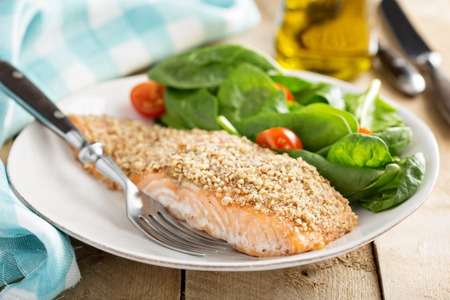The Basic Postpartum Diet

In this article, you will find:
More on EFAs
Vegetarian women tend to have much lower levels of DHA than nonvegetarians, and may have more pregnancy complications because of this deficiency. Women who are deficient in EPA and DHA have a sixfold greater risk of developing serious mental disorders such as depression and obsessive-compulsive disorder, and this risk remains higher for two years after giving birth. Vegetarian mothers can get DHA from some of the algae-based products designed with them in mind.
Babies and toddlers score higher on tests of intelligence and visual acuity if their mothers ate fish a few times weekly during pregnancy. Breastfed babies, who get a lot more DHA from mother's milk than their bottle-fed counterparts get from formula, also do better on intelligence and vision tests, and they are less vulnerable to attention deficit disorders and other behavioral and learning problems.
If you eat the typical Western diet, you were probably already depleted of DHA and EPA when you became pregnant. Your baby's body drew on your omega-3 stores to build its brain, nervous system, and cell membranes, and left you even more depleted. There is good scientific evidence that a lack of omega-3 fats passes from generation to generation; if your mother did not pass much on to you, your body has fewer stores to draw from during your own pregnancy, and if you have a daughter, her body could have even less of these essential fats to fortify her own offspring. It is therefore essential to replenish your omega-3 reserves.
Fish is the best natural source of DHA. Not all fish are good sources of this fatty acid and EPA. Fish that live in deep, cold waters, such as salmon, cod, sardines, anchovies, albacore tuna, herring, and mackerel, are your best sources of these essential fats. Because fish, like every other creature on the planet, contain toxins that come from the foods they eat, limit fish consumption to three times a week. Avoid swordfish, shark, and tilefish entirely when you are pregnant or nursing, because these species tend to retain higher levels of toxins in their flesh. Some nutritionists recommend farmed fish over wild fish to avoid toxins, but farmed fish are generally fed foods high in unsaturated oils such as soy and corn, so their DHA levels are lower. The best answer is probably to try to vary the type of fish you eat, alternating between farm-raised and wild-caught fish.
We recommend eating high-DHA omega-3 eggs. These eggs are laid by chickens fed a vegetarian, DHA-rich diet with algae added to their food. They are a great source of this essential fat, especially for women who don't like fish. (Although we are not aware of any studies on the intelligence and visual acuity of the chickens that lay omega-3 eggs, it is likely that they and their offspring are sharper than the average clucker!) Omega-3 eggs also contain six times more of the antioxidant vitamin E than other eggs.
We also recommend taking EFA supplements throughout pregnancy, nursing, and beyond.
Flaxseed oil, which is high in another omega-3 fatty acid, alpha-linolenic acid (ALA), is widely touted as an ideal omega-3 supplement for those who would rather not eat fish. ALA is indeed similar in structure to DHA and EPA, but the ALA molecule is slightly shorter in length causing it to be termed a short-chain omega-3 than these other two long-chain omega-3s. Thus, in order for ALA to be made into "good" prostaglandins or to build nervous-system tissues and cell membranes that function optimally, it must be transformed into EPA or DHA. Some research shows that this transformation can fulfill the body's EPA and DHA needs adequately, while other research casts doubt upon the body's ability to transform enough ALA to meet its needs.
The scientific jury is still out on this one, but after looking at hundreds of blood tests for fatty acid levels, we feel the best way to ensure that your DHA and EPA levels are sufficient is to eat foods that contain DHA and EPA. If you want a vegetarian supplement of these oils, seek out the ones made from algae. That is where the fish get their long-chain omega-3s. ALA can be a valuable addition to the diet, helping to balance out skewed omega-3 to omega-6 ratios.
We do not recommend that you use a lot of flaxseed oil to supply your diet with ALA. Flaxseed oil is one the least stable oils known. In other words, it spoils easily and goes rancid. If you eat rancid oil, you are ingesting toxic free radicals that have to be soaked up by your antioxidant stores, leaving fewer antioxidants to control the rest of the free radicals that are constantly forming throughout your body. Walnuts and pumpkinseeds are other good sources of ALA.